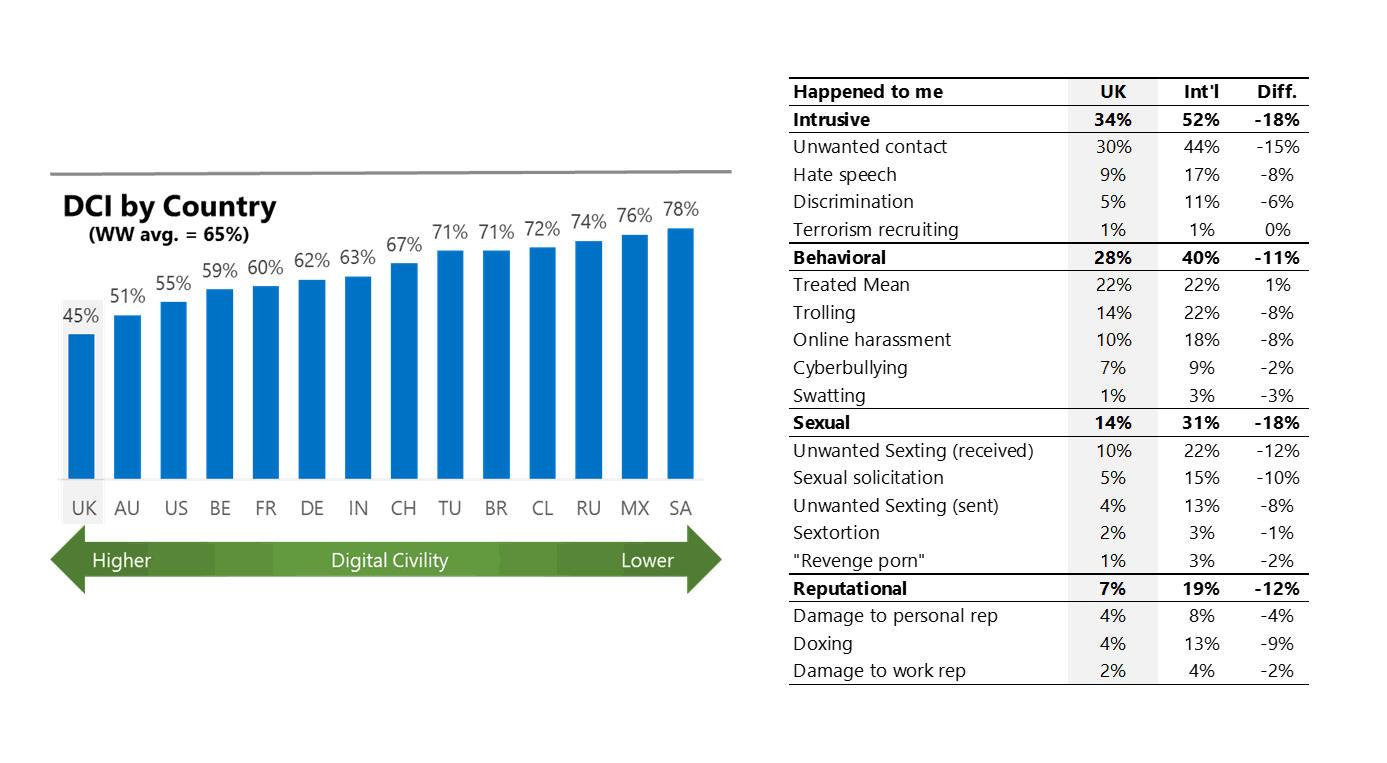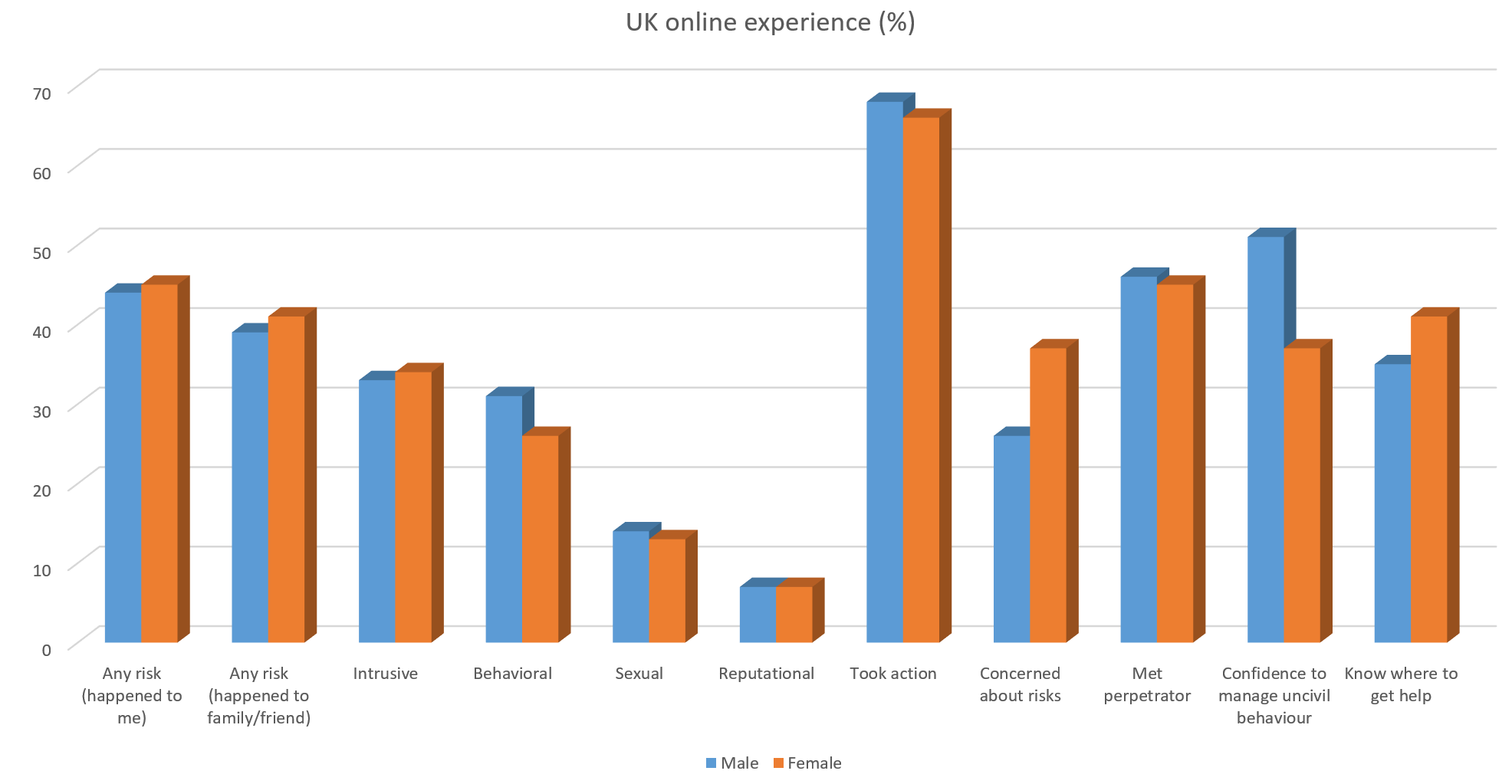
UK internet users abused less online, according to Microsoft’s Digital Civility Index
People in the UK have been exposed to less abuse while using the internet than those who live in many of the leading countries in the world.
Microsoft’s Digital Civility Index (DCI), which looked at the online risks faced by adults and teenagers in 14 nations, focused on the level of civility across four main categories – Behavioural, Intrusive, Reputational and Sexual.
The UK’s overall DCI score of 45% was the lowest out of all the countries surveyed, scoring significantly lower than the international average across all risk categories.
Inside the numbers
The highest risk in the UK was found to be intrusive and unwanted contact, which scored 30%, although the overall figure for intrusive risks (34%) was lower than the international average of 52%.
Behavioural was the second most common risk category, with mean treatment, online trolling and harassment being the top three most common behavioural risks.
Internet users in the UK also have a lower chance of experiencing sexual risks online according to the results, with a 14% risk compared with 32% internationally.
Reputational risks – damage to personal reputation, doxing (the publishing of private or identifying information) and damage to work reputation – were also all lower than the international average.
Young people aged 13-17 were found to have a greater number of online interactions, and were also more willing to share their risk experiences. They were also as confident as adults in managing uncivil behaviour, and were much more knowledgeable about where to get help.
Tips to stay safe online
While the research results for the UK were promising, there is still room for improvement. Nearly half of all those surveyed in this country were exposed to online risks, and while this is the lowest number among all the nations surveyed, it is still alarmingly high.
More than one-in-five people in the UK experienced a risk within the past month, and almost six-in-10 people revealed unidentified consequences from exposure to an online risk. Though this is significantly lower than the international average, more can be done to improve digital civility internationally and in the UK.
Online harassment and cyber bullying (both at 23%) showed the highest levels of risk, highlighting concerns about the online environment which young people in particular are exposed to.
Microsoft’s findings coincide with Safer Internet Day on February 7 – a global movement focused on making the internet a safer and better place for all, especially young people.
Will Gardner, Chief Executive of Childnet and Director of the UK Safer Internet Centre, said: “The internet should be a place where all young people can express and be themselves without facing bullying or abuse. This Safer Internet Day we hope everyone will join us to be part of the change for a better internet. Whether it is by showing support to others, being kind and respectful or reporting online abuse, there are plenty of ways that we can all take small actions to make a big impact overall”.
Becky Foreman, Corporate Affairs Director at Microsoft, echoed Gardner’s sentiments: “The internet gives us all fantastic opportunities to learn, work and socialise. However, our research shows that some people are concerned about the tone of interactions on the internet. The UK came top of our Digital Civility Index but that still means that 45% of the people surveyed had been exposed to an online risk. We are all impacted by the loss of trust which results.
“Today, I am pledging to take the Digital Civility Challenge for a more civil internet by acting with empathy in every interaction, respecting different perspectives, pausing before replying and standing up for others who suffer online abuse. I encourage others to join me in this vital task.”
The Digital Civility survey was completed by 7,000 people, who were asked to share their internet experiences. The 14 countries that took part were Australia, Belgium, Brazil, Chile, China, France, Germany, India, Mexico, Russia, South Africa, Turkey, United Kingdom and the United States.
See Microsoft’s tips for staying safe online and the Safer Internet Day website for more information.






